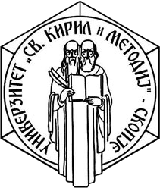| Име на трудот |
Место |
Држава |
|---|
| A Kind of Mind: Consciousness and AI |
in Consciousness Research Abstracts Book, Tucson III, Arizona, 50 |
|
| A Model for Agile Computer – Integrated Business Systems, Manufacturing Agility and Hybrid Automation-II |
of The Sixth International Conference on Human Aspects of Advanced Manufacturing: Agility and Hybrid Automation, IEA Press |
Hong Kong |
| Investigating Perception in Humans Inhabiting Simple Virtual Environments: An Enactivist View |
Cognitive Science Conference on Perception, Consciousness and Art, Vrije Universitaet in Bruxelles |
|
| Virtual Classroom and Virtual Laboratory |
Proceedings of 20th World Congress on Open Learning and Distance Education |
Germany |
| An agent based model as a marketing consultant of companies |
IEEE International Conference on Systems, Man, and Cybernetics (SMC2001), pp. 3113-3117 |
Arizona |
| Structure, Inner Values, Hierarchies, and Stages: Essentials for Developmental Robot Architecture |
in Proceedings of the 2nd International Workshop on Epigenetic Robotics, pp. 63-70 |
Sweden |
| A Model of an Expectancy-Driven and Analogy-Making Actor |
Proceedings of the IEEE, Computer Society, 2nd International Conference on Development and Learning |
Massachusetts |
| Incorporating ICT into Education in Macedonia |
Proceedings of the UNESCO International Sub-Regional Seminar: The Use of Distance Education and Information and Communication Technologies in Teacher Education: Trends, Policy and Strategy Considerations |
Ukraine |
| Interactivist approach to representation in epigenetic agents |
Proceedings of the 3rd International Workshop on Epigenetic Robotics |
Sweden |
| Web-access to the Library IT System at ETF (FEI) and MF (FMI) |
Proceedings of ETAI 2003 |
Macedonia |
| MapInfo Based Infrastructure - presentation and updating |
Proceedings of the ICEST 2004 |
Macedonia |
| Single Exponential Smoothing Method and Neural Network in One Method for Time Series Prediction |
Proc. of IEEE Int. Conf. on Cybernetics and Intelligent Systems |
Singapore |
| Tracking of unusual events in wireless sensor networks based on artificial neural-networks algorithms |
Proceedings of International Conference on Information Technology: Coding and Computing |
USA |
| Distributed Algorithm for a Mobile Wireless Sensor Network for Optimal Coverage of Non-stationary Signals |
Web Proceedings of the First Workshop on Spatial Stochastic Modeling of Wireless Networks held in conjunction with IEEE WiOpt 2005 |
Italy |
| Implementing artificial neural-networks in wireless sensor networks, Proceedings of IEEE Sarnoff Symposium on Advances in Wired and Wireless Communications |
Proceedings of IEEE Sarnoff Symposium on Advances in Wired and Wireless Communications |
USA |
| Data mining in wireless sensor networks based on artificial neural-networks algorithms |
Proceedings of Workshop on Data Mining in Sensor Networks in conjunction with 2005 SIAM International Conference on Data-Mining |
USA |
| Intelligent data aggregation in sensor networks using artificial neural-networks algorithms |
Technical Proceedings of the 2005 NSTI Nanotechnology Conference and Trade Show, Volume 3, pp. 427 – 430, Nanotech 2005 |
USA |
| Application of wavelet neural-networks in wireless sensor networks |
Proceedings of 6th ACIS International Conference on Software Engineering, Artificial Intelligence, Networking, and Parallel/Distributed Computing |
USA |
| Distributed data processing in wireless sensor networks based on artificial neural-networks algorithms |
Proceedings of The 10th IEEE Symposium on Computers and Communications |
Spain |
| Pocket PC Web – Access to the Library IT System |
Proceedings of 27th International Conference on Information Technology Interfaces - ITI 2005 |
Croatia |
| Learning patterns in wireless sensor networks based on wavelet neural-networks, |
Proceedings of the First International Workshop on Heterogeneous Wireless Sensor Networks, held in conjunction with the 11th IEEE International Conference on Parallel and Distributed Systems |
Japan |
| Modelling cortical plasticity in natural sensory systems |
Epigenetic Robotics Conference |
Japan |
| Integrating ART into scalable cognitive architecture |
Poster at Epigenetic Robotics Conference |
Japan |
| Mobile and Pocket Pc Web-Access to the Library IS as a Part of the Advanced Education |
Proceedings of the Eigth IASTED International Conference Computers and Advanced Technology in Education |
Aruba |
| Intelligent Data Acquisition and Processing Using Wavelet Neural-Networks |
Proceedings of the 3rd IEEE Workshop on Intelligent Data Acquisition and Advanced Computing Systems: Technology and Applications |
Bulgaria |
| GPRS and WAP–Access to the Library IT System |
Proceedings of ETAI 2005 |
Macedonia |
| A Robust Platform Supporting Interactivist Agent Architecture: Progress Report |
Interactivist Summer Institute |
South Carolina |
| Mobile Multimedia for Engineering Education in Signal Processing |
Proceedings of the 9th UICEE Annual Conference on Engineering Education |
Oman |
| Efficient Data Management in Wireless Sensor Networks using Artificial Neural Networks |
Final report for the 2005 Walter Karplus Summer Research Grant by the IEEE Computation Intelligence Society |
|
| Interactivism in artificial intelligence (AI) and intelligent robotics |
New Ideas in Psychology, Elsevier |
|
| On Curiosity in Intelligent Robotic Systems |
AAAI Fall Symposia |
USA |
| Emergence of Higher Order Motivational Systems in Artificial Agents |
Book of Abstracts, Interactivist Summer Institute |
France |
| An Autonomous Mental Development Architecture Implemented in a Scalable Database System |
Book of Abstracts, Interactivist Summer Institute |
France |
| Intelligent Wireless Sensor Networks Using FuzzyART Neural-Networks |
of the IEEE Symposium on Computers and Communications |
Portugal |
| HCI for m-Learning in Image Processing by Handhelds, Human Interface and the Management of Information |
Interacting in Information Environments, Lecture Notes in Computer Science, Springer, Volume 4558, pp. 299-308 |
|
| A System for Data Management in Wireless Sensor Networks |
ETAI 2007 |
Macedonia |
| Inductive Logic Programming and Embodied Agents: Possibilities and Limitations |
International Journal of Agent Technologies and Systems (IJATS), IGI Publishing, Inaugural Issue, pp 34-49 |
|
| Experiments in Data Management for Wireless Sensor Networks |
Second International Conference on Sensor Technologies and Applications, pp 191-195, SENSORCOMM |
France |
| K. Trivodaliev, S. Kalajdziski, A. Kulakov, D. Davcev, G. Mirceva |
Proceedings of IASTED International Conference on Artificial Intelligence and Soft Computing |
Spain |
| Stojkoska B., Davcev D., Kulakov A. |
Proceedings of The Fifth International Conference on Soft Computing as Transdisciplinary Science and Technology |
France |
| SGNG Protein Classifier by matching 3D structures |
Proceedings of The 4th International Workshop on Hybrid Artificial Intelligence Systems, |
Spain |
| Learning and Position Estimation of a Mobile Robot in an Indoor Environment using FuzzyART Neural Network |
IEEE/ASME International Conference on Advanced Intelligent Mechatronics |
|
| Inductive Logic Programming (ILP) and Reasoning by Analogy in Context of Embodied Robot Learning |
Proceedings of ICT Innovations Conference, |
Macedonia |
| System for Integrated Financial Data Based on Data Services |
Proceedings of ICT Innovations Conference |
Macedonia |
| Credit Risk Management through Client Classification by using K-Means and the Decision Tree |
Proceedings of ICT Innovations Conference |
Macedonia |
| The Role of Artificial Neural Networks in Detection of Pulmonary Functional Abnormalities |
Engineering Review, Vol. 29 No. 2, pp. 1-11 |
|
| Modified Growing Neural Gas Algorithm for Faster Convergence on Signal Distribution Sudden Change, |
Procedings of XXII International Symposium on Information, Communication and Automation Technologies |
|
| Position estimation of mobile robots using unsupervised learning algorithms |
Proceedings of ICT Innovations Conference |
Macedonia |
| System for prediction of the winner in a sports game |
Proceedings of ICT Innovations Conference |
Macedonia |
| Modeling attention within a complete cognitive architecture |
Book Chapter in Roda C., Ed., Attention Support in Digital Environments, Cambridge University Press, |
|






